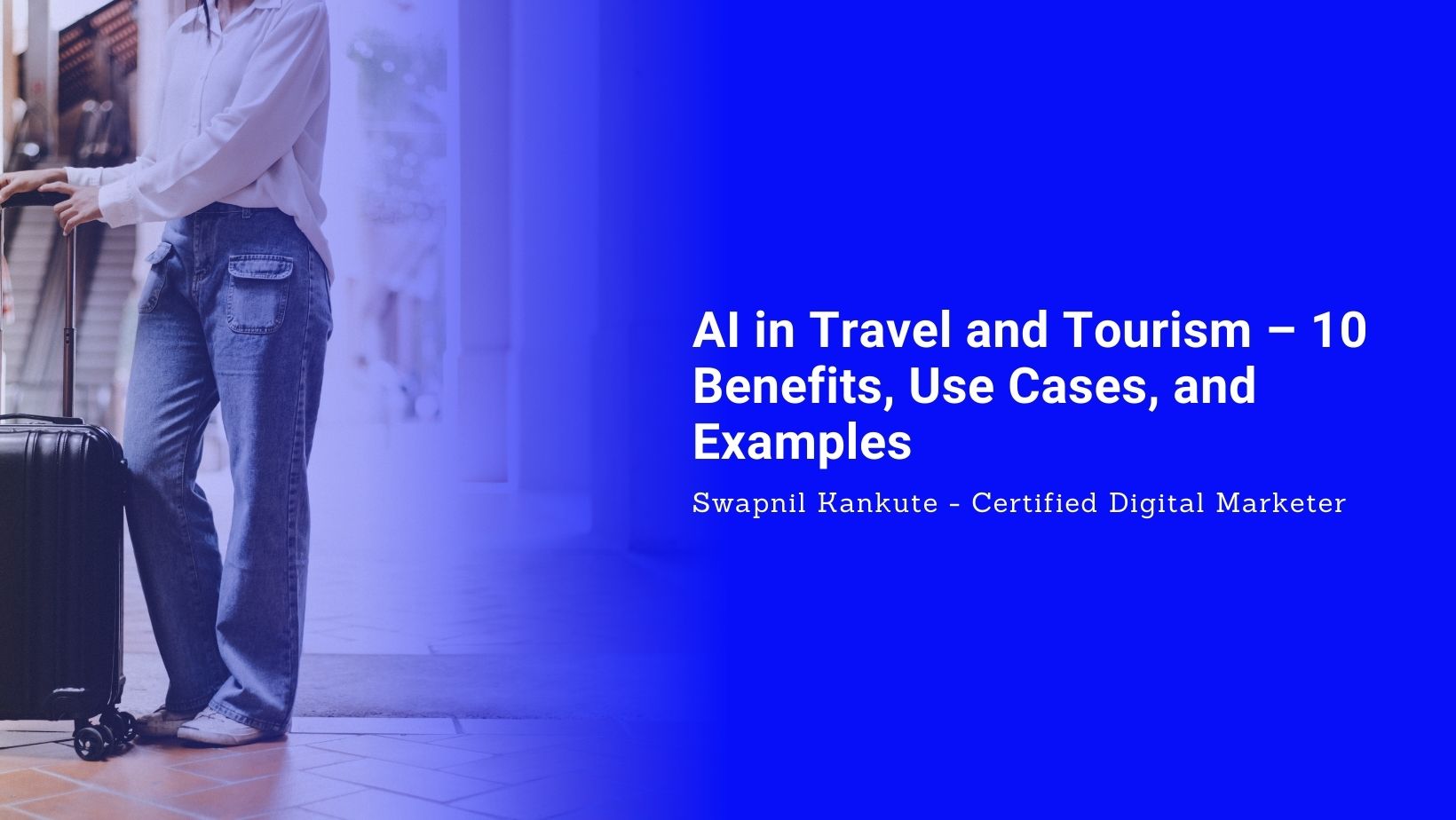I am Swapnil Kankute, Certified Digital Marketer. The travel and tourism industry is undergoing a significant transformation with the advent of Artificial Intelligence (AI). From enhancing customer experiences to optimizing operational efficiency, AI is revolutionizing the sector in numerous ways. Here, we explore 10 benefits of AI in travel and tourism, along with practical use cases and examples.
Table of Contents
ToggleUnderstanding AI in the Tourism Industry
What is AI and its use cases? AI, or Artificial Intelligence, refers to the simulation of human intelligence in machines that are programmed to think and learn. In the tourism industry, AI can be applied in various ways to improve efficiency, customer service, and profitability.
How can AI be used for travel? AI can be used in the travel industry to provide personalized customer experiences, optimize resource management, enhance customer insights, streamline operations, and improve marketing strategies. It enables businesses to deliver better services and make data-driven decisions that increase efficiency and customer satisfaction.
What are the use cases of AI in tourism? Use cases of AI in tourism include dynamic pricing, personalized marketing, AI chatbots for customer support, predictive analytics for demand forecasting, and sentiment analysis for understanding customer feedback.
1. Personalized Customer Experiences
Advantage: AI algorithms analyze vast amounts of data to understand customer preferences and behaviors, offering personalized travel recommendations and services.
Use Case:
- Chatbots and Virtual Assistants: AI-powered chatbots provide real-time assistance, answering customer queries and providing tailored suggestions.
Example:
- Booking.com: Uses AI to suggest personalized travel destinations and accommodations based on user preferences and past behaviors.
AI-driven personalization ensures that each traveler receives recommendations and services that cater to their unique preferences, leading to higher satisfaction rates and increased loyalty.
2. Dynamic Pricing
Advantage: AI enables dynamic pricing strategies, adjusting prices in real-time based on demand, seasonality, and competitor pricing.
Use Case:
- Revenue Management Systems: AI-driven systems optimize pricing for flights, hotels, and car rentals, maximizing revenue and occupancy rates.
Example:
- Airlines: Major airlines use AI to adjust ticket prices dynamically, ensuring competitive pricing while maximizing profit.
Dynamic pricing allows tourism businesses to be agile and responsive to market changes, ensuring they remain competitive and profitable.
3. Enhanced Customer Support
Advantage: AI-powered tools provide efficient and effective customer support, handling a large volume of inquiries with minimal human intervention.
Use Case:
- AI Chatbots: These chatbots handle bookings, modifications, cancellations, and general inquiries, providing instant responses.
Example:
- Hilton Hotels: Uses AI chatbots to assist guests with bookings and answer common questions, enhancing the customer service experience.
By automating customer support, businesses can ensure 24/7 availability, faster response times, and consistent service quality.
4. Predictive Analytics
Advantage: AI’s predictive analytics capabilities help businesses forecast trends and customer behaviors, enabling proactive decision-making.
Use Case:
- Demand Forecasting: AI predicts peak travel seasons, helping businesses prepare and allocate resources effectively.
Example:
- Expedia: Utilizes predictive analytics to forecast travel demand, optimize marketing strategies, and manage inventory.
Predictive analytics allow businesses to anticipate market trends and customer needs, leading to better resource management and strategic planning.
5. Fraud Detection
Advantage: AI enhances security by detecting and preventing fraudulent activities, ensuring safe transactions for customers and businesses.
Use Case:
- Payment Security: AI systems analyze transaction patterns to identify and flag suspicious activities.
Example:
- TravelPort: Implements AI-driven fraud detection systems to secure online bookings and payments, safeguarding customer data.
AI-driven fraud detection ensures secure transactions and builds trust with customers, protecting both the business and its clientele.
6. Automated Customer Service
Advantage: Automation of routine tasks through AI improves efficiency, allowing human staff to focus on more complex issues.
Use Case:
- Booking Management: AI automates booking confirmations, reminders, and follow-up communications.
Example:
- KLM Royal Dutch Airlines: Uses AI to handle social media inquiries and automate booking processes, ensuring timely responses.
Automating routine tasks frees up human resources to focus on strategic and value-added activities, enhancing overall productivity.
7. Image Recognition
Advantage: AI-powered image recognition enhances visual search capabilities, making it easier for customers to find and book services.
Use Case:
- Visual Search Engines: Customers can upload images to find similar travel destinations or accommodations.
Example:
- Google Travel: Implements image recognition to help users discover destinations based on uploaded photos.
Image recognition makes travel planning more interactive and intuitive, improving the customer experience by providing visually-driven recommendations.
8. Voice Search and Assistants
Advantage: AI-driven voice assistants provide a hands-free, convenient way for customers to search and book travel services.
Use Case:
- Voice Booking: Customers use voice commands to book flights, hotels, and rental cars.
Example:
- Amazon Alexa: Integrated with various travel platforms to assist users in booking and managing travel plans through voice commands.
Voice assistants offer a seamless and user-friendly way to interact with travel services, catering to the growing preference for voice-activated technologies.
9. Robotic Process Automation (RPA)
Advantage: RPA powered by AI automates repetitive tasks, increasing operational efficiency and reducing costs.
Use Case:
- Back-Office Automation: AI automates tasks like data entry, invoice processing, and customer feedback analysis.
Example:
- Airlines: Utilize RPA for automating ticketing processes, ensuring quick and error-free service.
RPA reduces manual workload and operational costs, allowing businesses to scale their operations efficiently.
10. Sentiment Analysis
Advantage: AI analyzes customer reviews and feedback to gauge sentiment, helping businesses improve their services.
Use Case:
- Review Analysis: AI tools analyze online reviews to identify trends and areas for improvement.
Example:
- TripAdvisor: Uses sentiment analysis to understand customer experiences and refine service offerings based on feedback.
Sentiment analysis provides actionable insights into customer satisfaction and areas for improvement, enabling continuous service enhancement.
Advantages of Leveraging AI in Tourism and Travel
How does AI help in the tourism industry? AI helps the tourism industry by providing personalized experiences, optimizing resource management, enhancing customer insights, streamlining operations, and improving marketing strategies. It enables businesses to deliver better services and make data-driven decisions that increase efficiency and customer satisfaction.
What are the cases of generative AI in the travel industry? Generative AI can be used to create personalized travel itineraries, generate content for marketing purposes, and simulate different travel scenarios to help businesses plan better. For example, generative AI can craft tailored travel plans based on individual preferences, or it can generate engaging content for social media and advertising campaigns.
How businesses can leverage AI? Businesses can leverage AI by integrating AI-powered tools into their operations. This includes adopting AI chatbots for customer service, using predictive analytics for demand forecasting, implementing dynamic pricing strategies, and utilizing AI for sentiment analysis. By doing so, businesses can enhance their operational efficiency, improve customer experiences, and drive profitability.
How to use AI for travel business? To use AI in a travel business, companies can start by implementing AI chatbots for customer service, using AI for personalized marketing campaigns, optimizing pricing strategies with dynamic pricing models, and employing AI for efficient inventory management. Additionally, AI can be used for predictive analytics to forecast demand and for sentiment analysis to understand customer feedback.
What travel companies are using AI? Many leading travel companies are using AI to enhance their operations and customer experiences. Examples include:
- Expedia: Uses AI to provide personalized travel recommendations and improve customer service through chatbots.
- Hilton Hotels: Employs AI-driven chatbots and virtual assistants to handle guest inquiries and bookings.
- KLM Royal Dutch Airlines: Utilizes AI for social media customer service and to provide real-time flight information.
- Booking.com: Leverages AI to offer personalized travel suggestions and optimize pricing strategies.
Conclusion
AI offers numerous benefits for tourism businesses, from personalized customer experiences and efficient resource management to enhanced customer insights and streamlined operations. By leveraging AI technologies, tourism businesses can maximize their operational efficiency, resulting in improved performance and increased profitability. Embracing AI is not just a trend but a strategic move towards sustained success in the competitive tourism industry.



